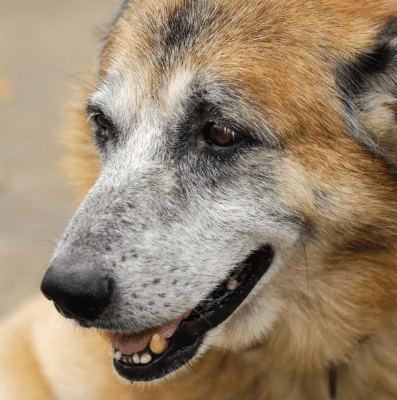Did You Know That November is Adopt A Senior Pet Month?
November is a month dedicated to raising awareness of the issues with senior pet adoption. Many folks don't want to adopt a senior pet, but it can be a fulfilling and truly life-changing experience.
When is A Dog Considered "Old / Senor / Elderly" anyway?
Smaller dogs are generally considered “senior” when they hit around 7 years old. Larger breed dogs tend to have shorter life spans. A large breed dog is considered senior when at around 5-6 years of age.
Fun fact :Dogs do not age 7 dog years for every 1 human year. The aging process in dogs is far more complicated than breaking it down so simply.
Remember, age is not a disease. Senior dogs almost invariably develop age-related problems over time. For you to take good care of them your beloved senior dog to live a happy life in their senior years.
What Are Some Common Issues In Senior Dogs?
A graying coat is nothing to worry about, and neither is your dog slowing down a bit. It's just part of getting old- you can't bound up the stairs like you used to either!
But it’s important to remember that, just like humans, aging dogs are undergoing and internal aging process. A senior dog is more likely to develop diseases such as heart, kidney and liver disease, cancer or arthritis. Take your dog to the local veterinarian if your dog is acting strangely in any way- throwing up, limping, unwillingness to eat, etc.
Believe it or not (believe it). cancer accounts for almost half of the deaths of pets over 10 years of age. Dogs acquire cancer at roughly the same rate as humans.
What's Normal For Older Dogs?
It's perfectly normal for dogs to lose some (even times a great deal) of their sight and hearing as they age. Older pets may develop cataracts, which results in your dog walking around with his/her head cocked a bit, leading the way with their good eye. A friend of mine used to have a dog with a single cataract, and the dog was always be leading her way around with the good eye forward... But I digress.
As your dog gets older, their hearing is bound to get worse. If your dog can't respond to your voice, try teaching an old dog a new trick! It'll take some time (and treats).
Simple gestures such as “come” or “stop” are all you really need.
Pets with poor sight or even near-blindness can navigate around in familiar environments. If your pet’s eyesight is on its way out, don't mess with the furniture! Your dog has a good mental map of what's in the room, and where.
Changes in activity
There are the tell-tale signs of aging issues, usually arthritis. You can see it when your dog is hopping in/out of the car, or on/off the couch. A dog with a case of arthritis may become irritated while being petted- especially over the arthritic areas.
Always go see a Vet when in doubt! Veterinarians have access to many therapies to help manage your pet’s arthritis and other age-related issues, and simple changes in your home such as orthopedic pet beds, raised feeding platforms, stairs and ramps may also help your older pet deal with arthritis.
Adopt a Senior Pet This Month!
We prefer dogs, of course, but we encourage folks to go out there, take the plunge, and adopt a senior pet this month. November is "Adopt a Senior Pet Month" and there is no better time to do it.
We all love puppies, but the truth is that elderly dogs get "thrown away" by families who can't handle the responsibility. Give adopting an elderly dog a chance. My friend loved her half-blind little pup. I have other friends who have adopted a few sets of elderly dogs- since sometimes they are bonded for long long it's a package deal. Everyone I speak to gets true joy out of caring for an elderly dog.
During this month I really hope that you give some thought about adopting an elderly dog and giving him or her a nice, caring home to spend the rest of their life in.


Share:
Pros and Cons of Grain Free Dog Food
Dog Sitter or Dog Kennel? Which is Better For Your Dog?